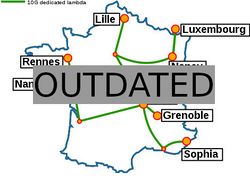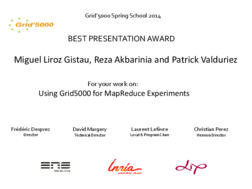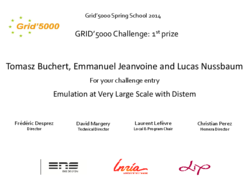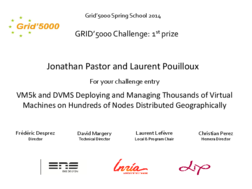Grid5000:Home
|
Grid'5000 is a large-scale and versatile testbed for experiment-driven research in all areas of computer science, with a focus on parallel and distributed computing including Cloud, HPC and Big Data. Key features:
|
Latest publications from Grid'5000 users
Five random publications that benefited from Grid'5000 (at least 2517 overall):
- Timothee Anne, Eloise Dalin, Ivan Bergonzani, Serena Ivaldi, Jean-Baptiste Mouret. First Do Not Fall: Learning to Exploit a Wall With a Damaged Humanoid Robot. IEEE Robotics and Automation Letters, 2022, 7 (4), pp.9028-9035. 10.1109/LRA.2022.3188884. hal-03740371 view on HAL pdf
- Leo Cazenille, Nicolas Bredeche, José Halloy. Automated optimization of multilevel models of collective behaviour: application to mixed society of animals and robots. Bioinspiration and Biomimetics, 2022, 17 (5), pp.055002. 10.1088/1748-3190/ac7fd1. hal-03842222 view on HAL pdf
- Vladimir Ostapenco, Laurent Lefèvre, Anne-Cécile Orgerie, Benjamin Fichel. Une comparaison expérimentale de wattmètres logiciels : focus sur le CPU. COMPAS 2022, Jul 2022, Amiens, France. hal-03946331 view on HAL pdf
- Nikolaus Frohner, Jan Gmys, Nouredine Melab, Günther R. Raidl, El-Ghazali Talbi. Parallel Beam Search for Combinatorial Optimization. SoCS 2022 - 15th International Symposium on Combinatorial Search, Jul 2022, Vienne, Austria. 10.1609/socs.v15i1.21783. hal-03689638 view on HAL pdf
- Sirine Sayadi. Architectures réparties et conteneurs logiciels sécurisés pour coopérations médicales multi-sites. Calcul parallèle, distribué et partagé cs.DC. Ecole nationale supérieure Mines-Télécom Atlantique, 2022. Français. NNT : 2022IMTA0331. tel-03922210 view on HAL pdf
Latest news
Grid'5000 tutorial days in Lille
We are happy to let you known that tutorials around Grid'5000 will be organized in Lille on November 20th, 2014, with a few seats available for people outside Lille. All information on the dedicated web page.
Grid'5000 spring school now finished
The Grid'5000 spring school took place between June 16th, 2014 and June 19th, 2014 in Lyon. Three awards were given for presentation or challenge entries (the challenge entries ended as a tie):
|
Best presentation award to Miguel Liroz Gistau, Reza Akbarinia and Patrick Valduriez |
Best challenge entry to Tomasz Buchert, Emmanuel Jeanvoine and Lucas Nussbaum |
Best challenge entry to Jonathan Pastor and Laurent Pouilloux |
Grid'5000 sites
Current funding
As from June 2008, INRIA is the main contributor to Grid'5000 funding.
INRIA |
CNRS |
UniversitiesUniversity Joseph Fourier, Grenoble |
Regional councilsAquitaine |





